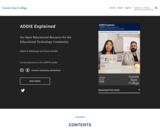
An introduction to the ADDIE model.
- Subject:
- Education
- Higher education
- Material Type:
- Textbook
- Provider:
- Granite State College
- Author:
- Albert D. Ritzhaupt
- Steve Covello
- Date Added:
- 12/14/2020

An introduction to the ADDIE model.
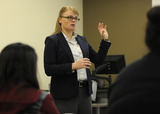
free digital textbook serves as a companion to EDUC 1300/1200/1100 Learning Framework: Effective Strategies for College Success at Austin Community College. This book is an accessible and relevant way to explore the research and theory in the psychology of learning, cognition, and motivation as well as factors that impact learning, and the presentation of specific learning strategies. This Open Educational Resource was remixed from a previous version found at https://courses.lumenlearning.com/austincc-learningframeworks/ by Heather Syrett and Laura Lucas.Senior Contributing Author and EditorHeather Syrett, Associate Professor and Assistant Department ChairStudent Development and General StudiesAustin Community CollegeContributing AuthorsEdgar Granillo, Professor and Assistant Department ChairStudent Development and General StudiesAustin Community College Laura Lucas, Adjunct ProfessorStudent Development and General StudiesAustin Community College Tobin Quereau, Adjunct ProfessorStudent Development and General StudiesAustin Community CollegeIt is maintained by Bethany Emory, Dean of teaching and Learning Support at Southwestern Community College. This free digital textbook serves as a companion to ACA-111 in the NCCCS.
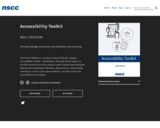
The NSCC Edition is a revised version of the BC Campus Accessibility Toolkit - 2nd Edition. The goal of this book is to provide resources for each content creator, instructional designer, educational technologist, librarian, administrator, and teaching assistant to create a truly open textbook—one that is free and accessible for all students.
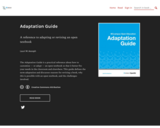
The Adaptation Guide is a practical reference about how to customize — or adapt — an open textbook so that it better fits your needs in the classroom and elsewhere. This guide defines the term adaptation and discusses reasons for revising a book, why this is possible with an open textbook, and the challenges involved.
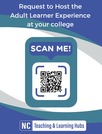
The Adult Learner Experience is a physical installation, a digital interactive exploration and a set of resources for faculty on adult learners.The Adult Learner Experience is designed to give you, our community college instructors, a deeper understanding of the diverse experiences of adult learners. As you explore each physical or digital poster, you’ll gain insights into the demographics of our adult students, the unique barriers they face, and the critical role faculty play in shaping their success.Through real-life student stories, data, and reflections, you will see how adult learners balance work, family, and education—and how small changes in teaching approaches, flexibility, and support can make a profound difference in their academic journey.We invite you to engage with these experiences, reflect on the challenges, and discover how you can contribute to breaking down barriers, fostering resilience, and creating a truly inclusive learning environment in your classroom. To host the Adult Learner Experience installation at your college, please fill out this Request Form.NC Teaching & Learning Hubs
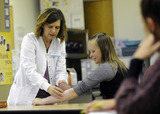
free digital textbook serves as a companion to EDUC 1300/1200/1100 Learning Framework: Effective Strategies for College Success at Austin Community College. This book is an accessible and relevant way to explore the research and theory in the psychology of learning, cognition, and motivation as well as factors that impact learning, and the presentation of specific learning strategies. This Open Educational Resource was remixed from a previous version found at https://courses.lumenlearning.com/austincc-learningframeworks/ by Heather Syrett and Laura Lucas.Senior Contributing Author and EditorHeather Syrett, Associate Professor and Assistant Department ChairStudent Development and General StudiesAustin Community CollegeContributing AuthorsEdgar Granillo, Professor and Assistant Department ChairStudent Development and General StudiesAustin Community College Laura Lucas, Adjunct ProfessorStudent Development and General StudiesAustin Community College Tobin Quereau, Adjunct ProfessorStudent Development and General StudiesAustin Community CollegeIt is maintained by Bethany Emory, Dean of teaching and Learning Support at Southwestern Community College. This free digital textbook serves as a companion to ACA-111 in the NCCCS.
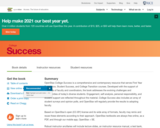
OpenStax College Success is a comprehensive and contemporary resource that serves First Year Experience, Student Success, and College Transition courses. Developed with the support of hundreds of faculty and coordinators, the book addresses the evolving challenges and opportunities of today’s diverse students. Engagement, self-analysis, personal responsibility, and student support are reflected throughout the material. College Success also includes an array of student surveys and opinion polls, and OpenStax will regularly provide the results to adopting faculty.
Based on OpenStax’s open (CC-BY) license and its wide array of formats, faculty may remix and reuse these elements according to their approach. OpenStax textbooks are always free online, as a PDF, and through our mobile app, OpenStax + SE.
Robust instructor ancillaries will include lecture slides, an instructor resource manual, a test bank, and other resources.
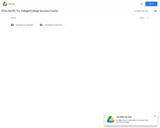
This course is designed to equip you with the tools to succeed during your college career. Simply attending school for many years is no guarantee that you have a clear understanding of the specific strategies needed to get what you want out of college. This course will provide the opportunity for you to learn and practice methods that will assist you in identifying and reaching your academic and career goals.
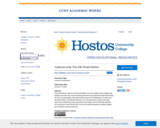
This presentation is about the Silk Road Market, one of the largest cases of illegal drug activity on the dark web, that the federal government has prosecuted. Beyond discussing the case, the presentation adds general facts about the US Department of Justice, the FBI and the DEA, and federal sentencing. The case discussion includes information about: Ross Ulbricht the creator and head of the market; how the Silk Road operated; the involvement of the FBI and DEA; the trial; the fourth amendment violations alleged by the defense; and the sentencing.
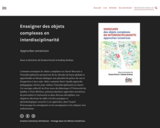
Comment enseigner les objets complexes en classe? Recourir à l’interdisciplinarité permettrait de les aborder de façon globale et approfondie en faisant dialoguer une pluralité de points de vue et d’expertises à leur sujet. Mais comment faire? Quelle approche pédagogique choisir pour réaliser l’interdisciplinarité en classe? Cet ouvrage collectif, né d’un cours de didactique à l’Université du Québec à Trois-Rivières, présente plusieurs approches novatrices, du préscolaire à l'université et dans diverses disciplines. Les chapitres décrivent les défis à la fois pratiques et épistémologiques associés à ces approches, dans l’espoir d’encourager les enseignants et les enseignantes à les adopter avec enthousiasme.
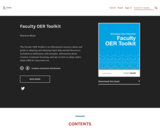
The Faculty OER Toolkit is an information resource about and guide to adapting and adopting Open Educational Resources. Included are definitions and examples, information about Creative Commons licensing, and tips on how to adapt and/or adopt OER for classroom use. School Counsellors can benefit from understanding OER.
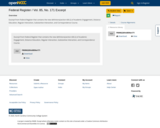
Excerpt from Federal Register that contains the new defintions(section 600.2) of Academic Engagement, Distance Education, Regular Interaction, Substantive Interaction, and Correspondence Course.
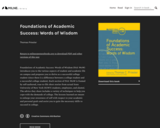
Foundations of Academic Success: Words of Wisdom (FAS: WoW) introduces you to the various aspects of student and academic life on campus and prepares you to thrive as a successful college student (since there is a difference between a college student and a successful college student). Each section of FAS: WoW is framed by self-authored, true-to-life short stories from actual State University of New York (SUNY) students, employees, and alumni. The advice they share includes a variety of techniques to help you cope with the demands of college. The lessons learned are meant to enlarge your awareness of self with respect to your academic and personal goals and assist you to gain the necessary skills to succeed in college.

A workbook for higher education instructors implementing Flipped Learning Design -- by Robert Talbert of Grand Valley State University
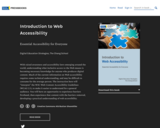
With raised awareness and accessibility laws emerging around the world, understanding what inclusive access to the Web means is becoming necessary knowledge for anyone who produces digital content. Much of the current information on Web accessibility requires some technical understanding, and may be difficult to consume for the average person. The instruction here will “interpret” the W3C Web Content Accessibility Guidelines (WCAG 2.1), to make it easier to understand for a general audience. You will have an opportunity to experience barriers firsthand, then experience that content with the barriers removed, developing a practical understanding of web accessibility.

This free digital textbook serves as a companion to EDUC 1300/1200/1100 Learning Framework: Effective Strategies for College Success at Austin Community College. This book is an accessible and relevant way to explore the research and theory in the psychology of learning, cognition, and motivation as well as factors that impact learning, and the presentation of specific learning strategies. This Open Educational Resource was remixed from a previous version found at https://courses.lumenlearning.com/austincc-learningframeworks/ by Heather Syrett and Laura Lucas.Senior Contributing Author and EditorHeather Syrett, Associate Professor and Assistant Department ChairStudent Development and General StudiesAustin Community CollegeContributing AuthorsEdgar Granillo, Professor and Assistant Department ChairStudent Development and General StudiesAustin Community College Laura Lucas, Adjunct ProfessorStudent Development and General StudiesAustin Community College Tobin Quereau, Adjunct ProfessorStudent Development and General StudiesAustin Community College
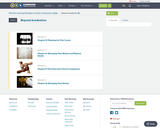

The only way to do great work is to love what you do. If you haven’t found it yet, keep looking. Don’t settle. –Steve Jobs, cofounder and CEO of AppleLEARNING OBJECTIVESBy the end of this section, you will be able to:Differentiate between “job” and “career”Explain the five-step process for choosing a careerList key strategies for selecting a college majorIdentify the relationship between college majors and career paths (both why they matter and why they don’t)Identify specific skills and transferable skills that will be valuable for your career path and how to acquire themDescribe the stages of career development and identify the stage you’re currently inIdentify sources for developing professional networksDefine the purpose and contents of an effective résumé and cover letterDescribe effective strategies to prepare for an interview

Being in control of your life and having realistic expectations about your day-to-day challenges are the keys to stress management, which is perhaps the most important ingredient to living a happy, healthy and rewarding life. —Marilu Henner, actressLEARNING OBJECTIVESBy the end of this section, you will be able to:Explore practices for ensuring mental health and emotional balance in your lifeIdentify sources, symptoms, and strategies for managing stressIdentify techniques for developing and maintaining healthy eating habitsDescribe the major risks of an unhealthy diet and the benefits of healthy eatingIdentify the benefits of regular exercise, for both body and brainIdentify the benefits of sleep for physical and mental healthExplain what substance use and abuse is and identify the warning signs that help may be neededIdentify sexually healthy behaviors, including protecting against unwanted pregnancy and sexually transmitted diseaseIdentify the risks of sexual assault, including date rape, and where to go for helpDefine and practice safety consciousness
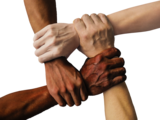
Diversity: the art of thinking independently together. —Malcolm Forbes, entrepreneur, founder of Forbes magazineLEARNING OBJECTIVESBy the end of this section, you will be able to:Define diversity and identify many aspects of diversityDifferentiate between surface diversity and deep diversity, and explain the relationship between the twoDefine and apply principles of cultural competencyExplore the positive effects of diversity in an educational settingDefine accessibility and identify implications of accessibility on campus and in communitiesIdentify strategies for responding to instances of prejudice and hate